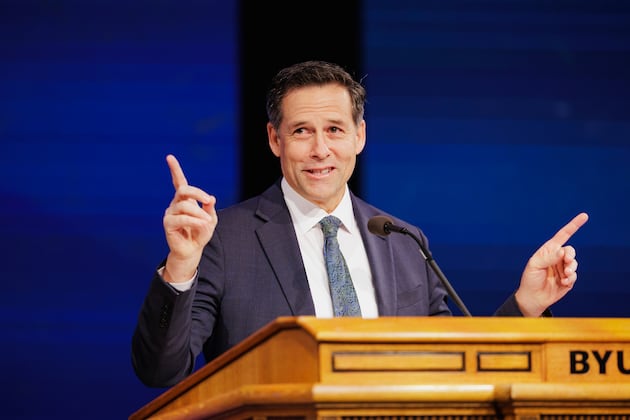November 11, 2025, 10:00 PM MST
In a Brigham Young University devotional on Tuesday, Nov. 11, Elder B. Corey Cuvelier of the General Authority Seventy pointed out that throughout the scriptures the Savior asks variations of the same question.
The beloved John and Nephi are asked, “What do you desire?” (D&C 7:1, 1 Nephi 11:2). John the Baptist asked two of his disciples, “What do you seek?” (John 1:38). To the mother of Zebedee’s children, “What do you want?” (Matthew 20:21). To the brother of Jared, he said, “What are you going to do to me?” (Ether 2:23).
“Do you see the pattern in the questions?” Elder Cuvelier asked the students and faculty gathered in the Marriott Center on the campus in Provo, Utah. “Each time, the Savior is teaching His followers, not testing them. When the Savior asks questions, it is not to inform Him, but so that we may be transformed.”
Elder Cuvelier explained that the Savior’s questions challenge individuals to look inward and think a little deeper to consider why and what they truly want and desire most.
“The Lord’s questions are not about our career path or daily plans, although He cares about these things as well as our well-being,” Elder Cuvelier said. “However, the answers to His questions should reflect our deepest desires. Ultimately, the Lord is inviting us to look beyond the world’s scales and align our ‘wants’ with His will.”
During a midnight devotion, Elder Cuvelier spoke of the need to educate one’s desires to align with the desires of our Heavenly Father. “Remember, before you were born, you followed Jesus. Now follow Him again and prepare for His return. Seek Him. Align your will with Him and you will find peace, direction, and joy far beyond anything you could have planned for yourself. I testify that Jesus Christ lives. He loves you. He always does His Father’s will, and He will strengthen your desire to do the same.”
“Educate our desires”
Elder Cuvelier said that when we trade our personal ambitions for eternal purpose, we discover that the Savior truly wants our joy, a lasting and eternal joy.
Elder Cuvelier said that all God’s miracles, revelations, and judgments flow according to God’s will and timing and personal desires, “to death or to life…to salvation or to destruction, according to (our) will” (Alma 29:4).
Christ modeled this perfectly. The Savior repeatedly taught, “I seek not my own will, but the will of the Father who sent me” (John 5:30).
“The Savior’s only desire was to be one with the Father. So if He were to stand before you today and ask, ‘What do you desire?'” –How would you respond? ” Elder Cuvelier asked the audience.
“I’ve had different answers to that question at different stages of my life,” he said, adding that throughout his life, the Lord patiently educated him and helped him prioritize his own desires.
“If the Savior were to stand before you today and ask you, “What do you want?”–how would you respond?”
— Elder B. Corey Cuvelier of the General Authority Seventy
For example, Elder Cuvelier said that during his mission to Brazil, he stopped seeking only blessings and began asking how he could be a blessing. But after completing his mission and returning to his studies and playing football for BYU and his friends and family, he felt his spiritual desires begin to dull.
So he asked his bishop for a call, began going to the temple more regularly, and looked for opportunities to share his testimony. “I learned that we must combine our own efforts and intentions with God’s grace to educate and strengthen our righteous desires,” Elder Cuvelier said.
Cultivating godly desires takes time and effort. “It’s not an easy path, but cultivating this desire and aligning our desires with God’s will is part of the journey back to our heavenly home,” he said.

Balancing the secular and the spiritual
“The Lord wants you to develop your talents and make a real difference in the world,” Elder Cuvelier asserted, citing President Spencer W. Kimball’s teaching that BYU students must be “bilingual” in both secular and spiritual matters.
“We must become fluent not only in discipleship and the gospel of Jesus Christ, but also in the language of our profession, profession, and training,” Elder Cuvelier said.
The Savior taught: “But seek ye first the kingdom of God and his righteousness, and all these things will be added to you” (3 Nephi 13:33).
“Dear friends, when we talk about our deepest desires, remember: It is good to want to study well, be successful, do your best, and have good relationships. The Lord wants you to enjoy this life and develop the talents you have been given,” Elder Cuvelier said. “But God also urges us to keep our eyes lifted up and make eternal life our greatest hope. We cannot afford to sacrifice or replace the temporal with the spiritual.”

invitation
“Spend a moment of quiet prayer. You may hear the Lord gently echoing the same question He has asked His disciples for centuries: ‘What do you desire?'” Share your deepest desires with your Heavenly Father. Then pause and listen. ”
Those who pray in faith, seeking God’s will and timing, will be answered, Elder Cuvelier promised. “God has promised to bless you, knowing that all things will be done according to your word, and you shall not seek anything contrary to His will” (Helaman 10:5).
